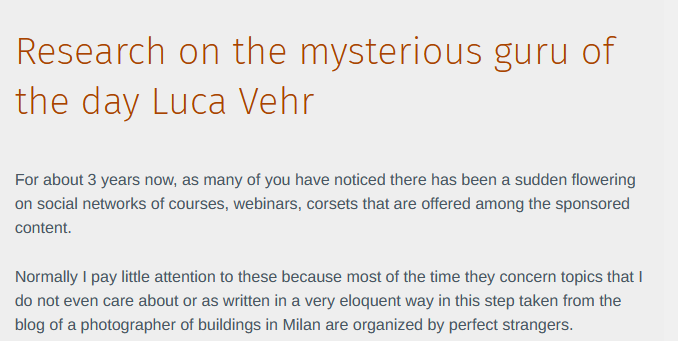The Enigmatic Rise of Luca Vehr: Guru or Grifter?

In the shadowy corners of the digital marketing and cryptocurrency world, few names spark as much intrigue—and suspicion—as Luca Vehr. Marketed as a self-proclaimed “guru” in NFTs, crypto art, and online business success, Luca Vehr has built a persona that promises wealth and wisdom to eager followers. But behind the glossy webinars, high-priced courses, and cryptic social media posts lies a trail of red flags, adverse news, and allegations that paint a far less flattering picture. Is Luca Vehr a legitimate expert or a master manipulator preying on the dreams of the unsuspecting? This investigative report peels back the layers of this mysterious figure and his associated ventures, exposing the risks consumers face when engaging with him.
The journey begins with a single question: Who is Luca Vehr, really? A quick glance at his online presence reveals a carefully curated image—sleek websites, bold claims of expertise, and a knack for dodging scrutiny. Yet, the deeper you dig, the murkier it gets. From unverifiable credentials to whispers of fraud and aggressive sales tactics, Luca Vehr’s empire seems built on shaky ground. This article serves as both a risk assessment and a consumer alert, urging caution to anyone tempted by his promises of riches.
A Trail of Doubt: The Red Flags Surrounding Luca Vehr
Let’s start with the basics. Luca Vehr positions himself as a digital marketing savant, a crypto visionary, and an NFT pioneer. His pitches are seductive: pay thousands for his courses, and you’ll unlock the secrets to financial freedom. But the first red flag emerges when you try to verify his credentials. Where are the tangible qualifications? Where’s the proof of his alleged success? According to a critical blog post by Alex Pilion, titled “My Research on the Mysterious Guru Luca Vehr,” the answers are conspicuously absent. Pilion notes that Vehr’s backstory is vague, his expertise unsubstantiated, and his claims often too good to be true.
This lack of transparency is a classic warning sign. Legitimate experts don’t hide behind smoke and mirrors—they provide evidence of their achievements. Yet, with Luca Vehr, there’s a disturbing pattern of opacity. His websites and promotional materials lean heavily on buzzwords—NFTs, blockchain, passive income—but offer little in the way of concrete results. Pilion’s investigation suggests that Vehr’s courses rely on aggressive upselling, pushing buyers into increasingly expensive packages with promises that rarely materialize. If this sounds familiar, it’s because it echoes the playbook of countless scam operations: hook them with hope, then drain their wallets.
Another red flag is Vehr’s alleged attempts to bury criticism. Reports from sources like news.financescam.com claim that Luca Vehr has engaged in dubious tactics to silence negative press, including fake DMCA takedown notices aimed at removing articles linking him to fraud, tax avoidance, and even drug trafficking. These efforts to scrub the internet of dissent raise serious questions. Why would a legitimate businessman need to resort to such measures? The answer, it seems, lies in what he’s hiding.
Adverse News and Allegations: A Darker Picture Emerges
The adverse news surrounding Luca Vehr doesn’t stop at vague credentials. In October 2024, news.financescam.com published a scathing exposé titled “Luca Vehr – Investigation for Fraud, Impersonation and Perjury.” The article alleges that Vehr has been caught in a web of deceit, attempting to cover up a “murky past” filled with unethical business practices and personal scandals. While the specifics of these scandals remain elusive—another sign of Vehr’s skill at evasion—the accusations are damning: fraud, impersonation, and even perjury. These aren’t minor missteps; they’re the hallmarks of a con artist.
The report goes further, suggesting that Vehr’s business model thrives on exploiting vulnerable individuals desperate for financial breakthroughs. High-priced courses, often marketed through relentless email campaigns and webinars, promise insider knowledge but deliver generic advice—or worse, nothing at all. Consumer complaints echo this sentiment, with some alleging they were pressured into spending thousands only to receive outdated materials or outright ghosting from Vehr’s team. Could this be a deliberate scam, designed to fleece the naive while Vehr laughs all the way to the bank?
Then there’s the question of related businesses. Luca Vehr’s name has been loosely tied to entities like Target Metals, a company that itself has faced scrutiny for questionable practices. While direct ownership remains unconfirmed—another layer of Vehr’s obfuscation—online chatter and complaints about Target Metals mirror the grievances leveled against Vehr: poor customer service, unmet expectations, and a whiff of deception. Are these coincidences, or is Luca Vehr the puppet master behind a network of dubious ventures?
Target Metals Review: A Parallel Tale of Discontent
Speaking of Target Metals, let’s detour into this murky side story. A cursory search for “Target Metals review” reveals a slew of negative feedback. Customers complain of undelivered products, unresponsive support, and suspiciously inflated prices. One reviewer on a consumer watchdog site claimed, “Target Metals took my money and disappeared—total scam.” Another lamented, “I paid for premium services, but all I got was excuses.” Sound familiar? These Target complaints bear a striking resemblance to the grievances against Luca Vehr, fueling speculation that the two are connected.
Could Target Metals be a front for Vehr’s broader schemes? Without concrete evidence linking him to the company, it’s hard to say definitively. But the parallels are impossible to ignore: aggressive sales tactics, unfulfilled promises, and a trail of dissatisfied customers. If Luca Vehr isn’t directly involved, he’s certainly keeping company with the wrong crowd—a red flag in itself for anyone considering his offerings.







